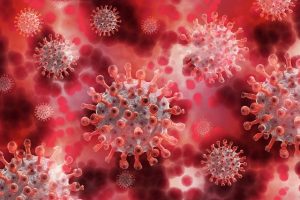NEJM: The results of mRNA COVID-19 Vaccine are amazing
- Mifepristone: A Safe and Effective Abortion Option Amidst Controversy
- Asbestos Detected in Buildings Damaged in Ukraine: Analyzed by Japanese Company
- New Ocrevus Subcutaneous Injection Therapy Shows Promising Results in Multiple Sclerosis Treatmen
- Dutch Man Infected with COVID-19 for 613 Days Dies: Accumulating Over 50 Virus Mutations
- Engineered Soybeans with Pig Protein: A Promising Alternative or Pandora’s Dish?
- Severe Fever with Thrombocytopenia Syndrome (SFTS): A Tick-Borne Threat with High Mortality
NEJM: The results of mRNA COVID-19 Vaccine are amazing
NEJM: The results of mRNA COVID-19 Vaccine are amazing. The mRNA COVID-19 nucleic acid vaccine BNT162b2 has taken another step towards “global use”.
Saudi Health Minister Taufik Rabye was one of the first Saudis to be vaccinated that day. The British Broadcasting Corporation (BBC) reported that on December 24, local time, the Republic of Ireland approved the use of the mRNA COVID-19 nucleic acid vaccine BNT162b2. The first batch of vaccines will be delivered soon, and vaccination will start at the end of the month. On the same day, Serbia launched a large-scale vaccination campaign of this type. The country’s first vaccinator was Prime Minister Brnabic. According to the US “Capitol Hill” news, Saudi Crown Prince Mohammed bin Salman has also completed the first vaccination.
The day before, “Reuters” quoted statistics from the Centers for Disease Control and Prevention (CDC), stating that as of 9 a.m. local time on the 23rd, 1,008,025 Americans had received the first dose of the mRNA COVID-19nucleic acid vaccine BNT162b2. On the same day, the US Department of Defense issued a statement confirming that the federal government has increased its purchase of 100 million doses of this vaccine. U.S. Secretary of Health and Human Services Aza believes that reaching an additional purchase agreement will inject more confidence into Americans.
In China, “China Business News” reported that, promoted by Shanghai Fosun Pharmaceutical (Group), the phase II clinical trial of mRNA COVID-19 nucleic acid vaccine BNT162b2 in Taizhou and Lianshui, Jiangsu Province, completed all 960 subjects ahead of schedule on December 19 Enrolled in the group and has not received any serious adverse event reports.
“There is nothing to worry about.” On December 21st, US President-elect Biden said after publicly vaccinating the vaccine that many government officials have been vaccinated, hoping to prove the safety and effectiveness of the vaccine to the American people.

“Amazing” Phase III results
Up to now, only a few COVID-19 vaccines have released the effectiveness and safety results of phase III clinical trials. The mRNA COVID-19 nucleic acid vaccine BNT162b2 is one of them.
On December 10, the New England Journal of Medicine (NEJM) released the final data of its Phase III clinical trial, claiming that the effectiveness of the two-dose vaccination program reached 95%, far exceeding the minimum 50% threshold set by the FDA.
The Phase III clinical trial started at the end of July 2020. A total of 43,448 healthy people were enrolled, and they were randomly assigned to the BNT162b2 vaccine group or the placebo group at 1:1. In the end, 21720 participants received the mRNA COVID-19 nucleic acid vaccine BNT162b2, and 21728 received a placebo. Both groups received two injections 21 days apart. The primary endpoint was safety and the occurrence of symptomatic new coronavirus pneumonia at least 1 week after the second dose of vaccine or placebo.
“The results are amazing.” NEJM commented.
Let’s first look at the protective efficacy of the vaccine. A total of 170 infections occurred in people who were determined to have no evidence of infection (serum and nucleic acid test results). Among them, there were only 8 cases in the vaccine group and 162 cases in the placebo group. From this calculation, the protection rate of BNT162b2 was 95.0%. The two groups of severely ill patients were 1 case and 9 cases respectively, indicating that vaccination can effectively prevent the aggravation of new coronavirus pneumonia symptoms.
Second, subgroup analysis showed that regardless of age, gender, race, ethnicity, and obesity coexistence status (≥30 kg/m2), BNT162b2 has a good and consistent protective effect.
Take the obese subgroup as an example. In July, the “Brain, Behavior and Immunity” magazine published an article stating that overweight people are about twice as likely to develop new coronavirus pneumonia as normal weight patients. Regarding the Phase III data of the mRNA new coronavirus nucleic acid vaccine BNT162b2, whether obese or not, the effective rates of vaccination were 95.4% and 94.8%, respectively, which was equivalent to 95% of the total population.
Recently, some self-media said that the effective rate of BNT162b2 for Asians is 74.4%, worrying about insufficient protection. Immediately an analysis pointed out that this may be related to the overall sample size.
According to the official website of the US FDA, Asians (including Indians) accounted for 4.4% of the study participants. There were 796 people in the vaccine group, and 1 person was infected; in the placebo group, there were 808 people and 4 people were infected. From this, the effective rate of Asians was 74.4%, and the 95% confidence interval (95% CI) was (-158.7, 99.5).
According to The Paper, this can be understood as the real effective rate fluctuates between -158.7% and 99.5%. Such a huge difference indicates that there is a very small change in the number of infected people, which will cause a significant increase in the vaccine efficiency. For example, if the number of infections in the vaccine group increases from 1 to 2, the vaccine effective rate will drop to 49.2%, which is caused by the small overall sample size.
In April this year, the World Health Organization agreed that the COVID-19 vaccine can provide 50% protection efficiency for people exposed to high risk within 6 months, which can accelerate marketing approval. The threshold of effectiveness in the United States is set at 50%. As a control, the effectiveness of the common flu vaccine is about 70%. The comparison shows that the effectiveness of the mRNA new coronavirus nucleic acid vaccine BNT162b2 far exceeds expectations.
In addition, “few people were excluded from the trial, and the results are sufficiently representative.” The US “Business Insider” article stated that the mRNA new coronavirus nucleic acid vaccine BNT162b2 excludes people under 16 years of age, breastfeeding women and pregnant women, as well as drugs People with severe allergic reactions. Actively enroll patients with diseases such as immunocompromised, diabetes, hypertension, obesity comorbidities, liver disease, chronic pneumonia and heart disease. The results showed that the efficacy of vaccination in subjects with different comorbidities was basically consistent with the overall observed efficacy of vaccines. “In general, the results of the test are impressive and enough to support any analysis we can think of. This is a victory.” NEJM commented.
How to understand adverse reactions?
“With the large-scale vaccination, there is something that may make the people hesitate.” According to Fortune, “There is something”, as of the morning of December 19, 6 people in the United States who received the mRNA COVID-19 nucleic acid vaccine had severe allergic reactions ( Severe allergic reaction, also called Anaphylaxis).
The “intellectuals” published a paper pointed out that the allergic reaction after the initial vaccination of the vaccine is generally not related to the pathogen components in the vaccine, but is caused by other components in the vaccine, including medium residues, stabilizers, and preservatives. These substances are present in almost every vaccine.
In theory, all vaccines may cause severe allergic reactions. A study published in 2016 stated that the author analyzed more than 25 million vaccination data from 2009 to 2011 and found 33 cases of severe allergic reactions after vaccination. Almost all common vaccinations have severe allergic reactions. The most frequent one is the rabies vaccine, with 55.4 cases per million vaccinations. The vaccination situation in the United States as of December 19 shows that the frequency of severe allergic reactions to the mRNA COVID-19 nucleic acid vaccine is 22 cases per million. This did not exceed the previous highest value of a single vaccine.
Reuters reported that the United States is investigating related allergy cases. “Fortune” pointed out that this news may make people feel uncomfortable, but it should not be rejected for this reason. On the one hand, for most people who have no history of allergies, the chances of vaccinating the mRNA COVID-19 nucleic acid vaccine BNT162b2 causing harm are very small. The research results released by NEJM and the conclusion drawn by the US CDC have confirmed this.
NEJM showed that common adverse reactions after BNT162b2 vaccination included injection site reactions (84.1%), headache (55.1%), muscle pain (38.3%), chills (31.9%), arthralgia (23.6%) and fever (14.2) %). In the injection site reaction, 51.1% of the participants reported mild pain at the injection site; 30% had moderate pain; and severe pain or worse, only 1%. Other adverse reactions, such as redness and swelling, are less common, and the overall adverse events are short-lived and will get better within a few days after they appear.
On the other hand, “the skepticism about safety is understandable. But vaccination is always better than contracting the COVID-19 virus, which is much more dangerous.” According to Fortune, the current number of COVID-19 pneumonia infections in the United States is nearly 19 million. The related death toll exceeded 320,000. This is more than five times the upper limit of the estimated range of annual flu-related deaths from the CDC in the United States since 2010.
At present, research on the mRNA COVID-19 nucleic acid vaccine BNT162b2 is still continuing. For example, the research and development company BioNTech, a German biotechnology company, expects to obtain data related to asymptomatic infection, virus shedding, or infectivity at the end of January or February 2021. In the future, data on the safety and immune response of the vaccine to adolescents aged 12-15 will be reported, and the preventive effect on pregnant women, children under 12 years old and people at special risks will be evaluated.
Fosun Pharma revealed that once it has been approved for listing in the Chinese mainland market, it is expected to supply at least 100 million doses of the mRNA new coronavirus nucleic acid vaccine BNT162b2 to the Chinese mainland market in 2021 to respond to the COVID-19 pneumonia epidemic.
(source:internet, reference only)
Disclaimer of medicaltrend.org
Important Note: The information provided is for informational purposes only and should not be considered as medical advice.



